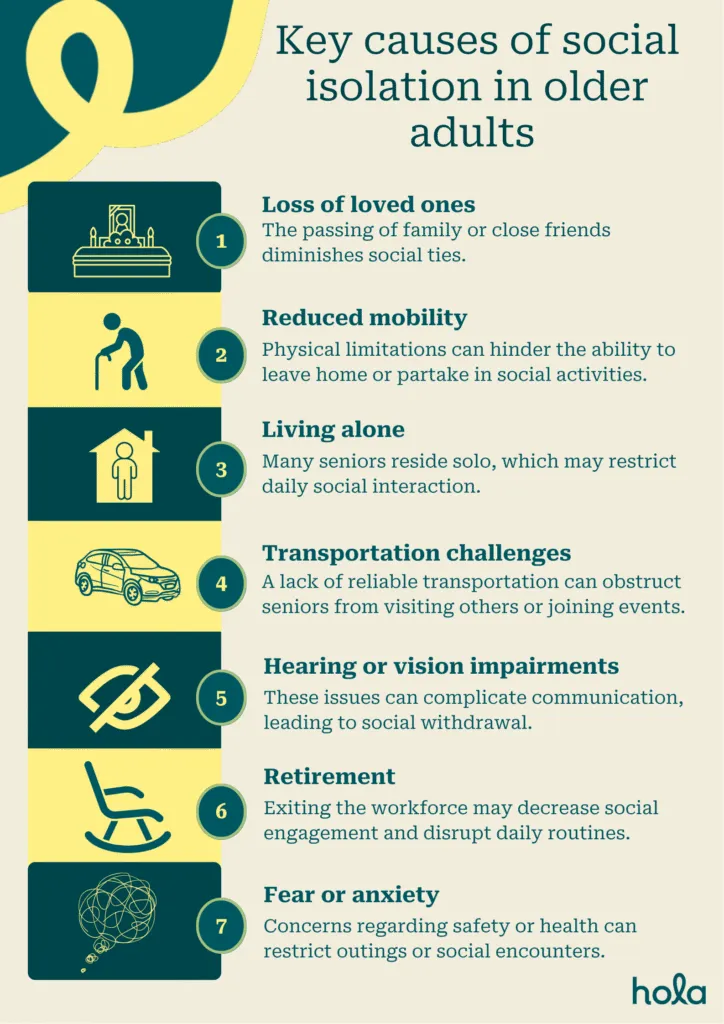Causes and effects of elderly social isolation
Written by editorial staff writer at Hola. Medically reviewed by Amira Shah, MA in Counselling Psychology, Registered Psychotherapist.

Contents

Summary: Elderly social isolation often stems from health issues, loss of loved ones, and distance from family. It can seriously impact mental and physical health. Combating this needs a collective community effort to keep seniors connected, supported, and valued, improving their overall well-being.
Imagine reaching a point in life where you have all the time in the world, but no one to share a cup of tea or a good conversation. It’s a quiet kind of loneliness, and it affects many seniors. In Australia, around 1 in 5 (19%) older individuals experience social isolation1. The good news? Identifying the causes is key to making a difference. Social connection isn’t just a luxury, it’s a necessity. With attention and care, we can help ensure our elders stay connected, valued, and full of life.
Understanding social isolation vs. loneliness
Social isolation and loneliness, while interconnected, represent distinct experiences. Social isolation denotes having minimal or no social interaction with others, which implies that a person may be physically alone or have limited engagements. Conversely, loneliness is an emotional experience; it reflects the distress or pain that arises from feeling disconnected or misunderstood, even in the company of others. A person can experience social isolation without feeling lonely, or conversely, experience loneliness despite being socially engaged. Understanding this distinction is crucial for identifying appropriate support and solutions.Why are both serious health risks for seniors
Both social isolation and loneliness pose significant health threats for seniors as they can result in various physical and mental health issues. Social isolation heightens the likelihood of developing high blood pressure, heart disease, and weakened immune function. Loneliness can lead to depression, anxiety, and cognitive decline. These factors may also result in poor sleep, heightened stress, and unhealthy behaviours such as poor nutrition or insufficient exercise. These consequences can diminish the quality of life, increase hospital visits, and elevate the risk of premature death among older adults.Ready for positive change? Start your mental health care plan here.
Book an appointment
Fully bulk-billed, across Australia.
Key causes of social isolation in older adults
Primary factors contributing to social isolation in older adults include:- Loss of loved ones: The passing of family or close friends diminishes social ties.
- Reduced mobility: Health conditions or physical limitations can hinder the ability to leave home or partake in social activities.
- Living alone: Many seniors reside solo, which may restrict daily social interaction.
- Transportation challenges: A lack of reliable transportation can obstruct seniors from visiting others or joining community events.
- Hearing or vision impairments: These issues can complicate communication, leading to social withdrawal.
- Retirement: Exiting the workforce may decrease social engagement and disrupt daily routines.
- Fear or anxiety: Concerns regarding safety or health can restrict outings or social encounters.

Why mental and physical health effects of elderly isolation
The mental and physical health repercussions of elderly isolation are closely interrelated and can profoundly affect well-being. On a mental level, isolation can foster depression, anxiety, feelings of loneliness, and cognitive decline, which heightens the risk of dementia. Physically, it can compromise the immune system, elevate blood pressure, and heighten susceptibility to heart disease. Isolation frequently leads to inadequate sleep, low energy, and reduced motivation to stay active or eat well, worsening overall health. Collectively, these impacts can lower the quality of life and potentially shorten lifespan in older adults.What are the solutions and support for elderly isolation
Strategies and support for combating elderly isolation emphasise restoring social connections and enhancing overall well-being:- Promoting consistent communication with family and friends through visits, phone calls, or video chats can alleviate loneliness.
- Community initiatives such as senior centres, hobby groups, or exercise classes offer opportunities for social engagement and physical activity.
- Access to transportation services can facilitate seniors' ability to go out and join in activities.
- Professional assistance from therapists or social workers can cater to mental health needs.
- Additionally, technology training can empower seniors to engage online and access resources, thus enhancing their sense of belonging and support.
How telehealth and mental health support work
Telehealth and mental health support operate by linking individuals with healthcare providers via video calls. This allows seniors to receive assistance from therapists, counsellors, or online doctors without needing to travel. Telehealth enhances access to mental health services, particularly for those facing mobility challenges or living far from healthcare facilities. It enables regular check-ins, therapy sessions, and guidance on maintaining emotional wellness. Many platforms also offer private, adaptable appointment options, making it simpler for older adults to obtain the necessary care at their convenience.Conclusion:
Social isolation in older adults is a serious issue—but it’s something we can change together. By staying connected, checking in, and fostering engagement, we can help our elders feel acknowledged, respected, and included because connection is a right, not a privilege.FAQs
Is loneliness a normal part of ageing?
While many seniors may feel lonely, it’s not an inevitable or natural part of growing older. Loneliness often stems from transitions but can be addressed through social connections, activities, and support. Everyone, no matter their age, deserves deep, meaningful connections.What health risks are associated with long-term loneliness in seniors?
Prolonged loneliness in seniors can increase the risk of depression, anxiety, memory loss, cardiovascular issues, high blood pressure, weakened immunity, and even premature death. It can also disrupt sleep, reduce exercise, and lead to poor self-care. Social connection is vital for healthy ageing.Can pets help reduce loneliness in elderly people?
Yes, pets can be excellent companions for older adults. They add routine, emotional warmth, and a sense of purpose. Spending time with animals can reduce stress, ease feelings of loneliness, and even inspire movement and social engagement.Can social isolation lead to depression or anxiety in older adults?
Yes, social isolation can significantly increase the risk of depression and anxiety in older adults. Lack of social interaction often leads to loneliness, low morale, and emotional challenges that may develop into serious health concerns.How can families help reduce loneliness in elderly loved ones?
Families can support older loved ones by keeping in touch through visits, phone calls, video chats, encouraging involvement in group or community events, and providing transport when required. Thoughtful gestures like sharing meals, listening, or involving them in family gatherings can go a long way in helping them feel connected and valued.Can telehealth help older adults who are socially isolated?
Yes, telehealth is a helpful resource for socially isolated older adults. It provides convenient access to medical care, mental health support, and routine follow-ups without the stress of travelling. It also creates a sense of connection and reassurance, especially when getting out isn’t possible.Take control of your mental health. Begin your care plan now.
Book an appointment
Fully bulk-billed, across Australia.
What we treat
- Cough
- Nausea & vomiting
- Fever
- Hayfever
- Fatigue
- Sore throat
- Acne
- Hair loss
- Gout
- Eczema
- Rosacea
- Sunburn
- UTI
- Erectile dysfunction
- Contraception
- Morning sickness
- Morning after pill
- Prostate health
- Anxiety
- Depression
- Stress
- Grief & loss
- Antidepressants
- Premature ejaculation
- Asthma
- Blood pressure
- Blood thinners
- Diabetes
- Cholesterol
- Migraines & headaches
- Allergies
- Body ache
- Heartburn & reflux
- Sleep disorder
- Pain relief
- Gastro
Related Articles
What Is Online Therapy? Everything You Need To Know About e-Therapy
February 19, 2026Mental Health
...
Disclaimer
This blog is for general informational purposes only and does not indicate that Hola Health provides all treatments or preventive measures mentioned. It is not intended to be a substitute for professional medical advice. Always seek the guidance of your doctor or other qualified health professional with any questions you may have regarding your health or a medical condition. For emergencies please immediately contact 000. Any medical topics discussed are intended to educate, not to imply availability through Hola Health.
 Facebook
Facebook  X
X  Copy Link
Copy Link



